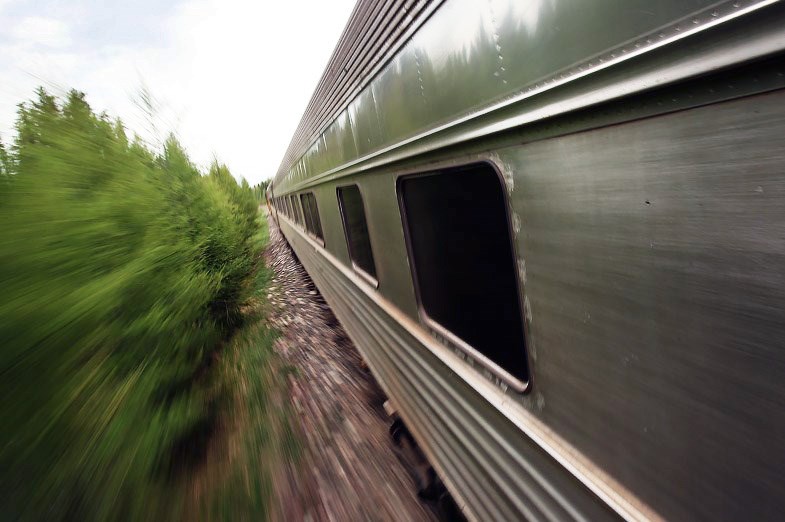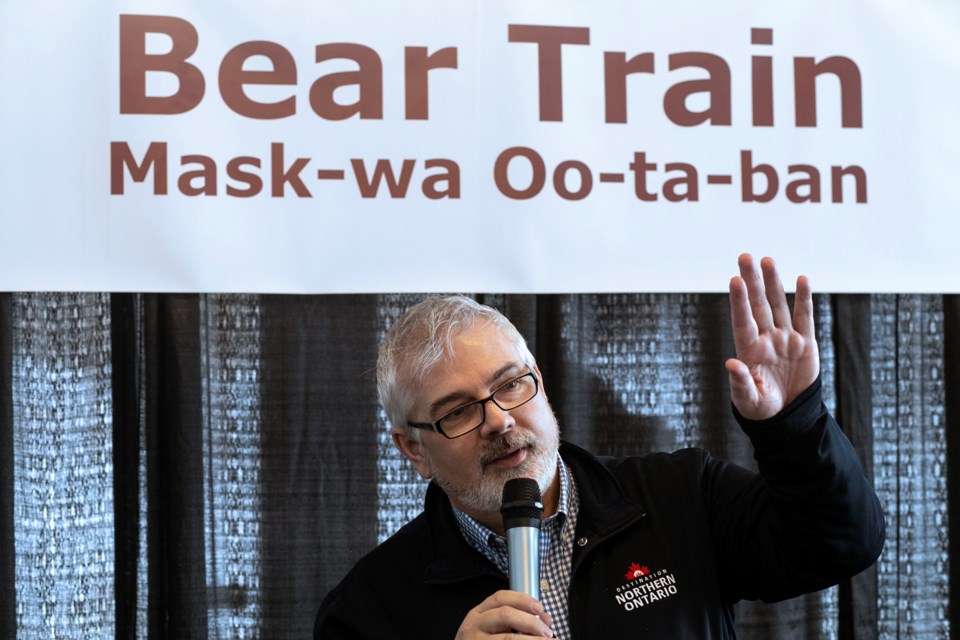Hope still lingers for the return of a Sault-based passenger train service mothballed almost 10 years ago due to a cut in federal funding.
Although, proponents of a new Bear Train say the price tag to get it back on track has gone way up in that time.
About 100 people packed into the front lobby of the Agawa Canyon Train Station on Thursday for what was described as an exciting development in the return of passenger service from the Sault leading north to Oba Lake.
The announcement ended up being about a study recently completed by CPCS, a management consulting firm specializing in the transportation and energy sectors, which outlines the potential path forward for the service — pending funding.
"It's not a definite go at this point but we have the information to go and approach funders and government," said David MacLachlan, executive director of Destination Northern Ontario, a regional tourism organization that was one of the partners involved in commissioning the study.
The CPCS study was conducted at a cost of about $80,000, shared between stakeholders working together to revive the service, including businesses, Mask-wa Transportation Association and the Coalition for Algoma Passenger Trains.
MacLachlan said the study looked at the costs associated with restarting and operating the passenger rail service and did not include an economic impact report, as was done in 2014 when stakeholders were trying to prevent CN from closing the train.
Some in the crowd were visibly disappointed when it was revealed the announcement was very preliminary, with no confirmation of service returning any time soon.
The Algoma Central Railway (ACR) passenger service from Sault Ste. Marie to Hearst that was operated by CN Railway was unceremoniously shuttered in 2014, before a very short-lived revival by Railmark which only lasted a few weeks and hasn't run since. The ACR passenger service is not to be confused with the Agawa Canyon Tour Train, which operates on the same tracks but ends at Mile 144 Canyon Park.
Watco took over operation of the 245-mile stretch of tracks running from the Sault to Oba in 2022 and agreed to continue operation of the Agawa Canyon Tour Train. Watco also signed a memorandum of understanding with the Missanabie Cree First Nation at the time regarding partnership opportunities for the Algoma Central Railway.
Through the work done by Missanabie Cree First Nation and partners, the proposed replacement passenger rail service was rebranded Mask-wa Oo-ta-ban, or the Bear Train.
MacLachlan said improvements would have to be made to allow for an eventual rail service to resume operating past the southern section of Oba Lake. Specifically, floating trestles on the water there would need to be repaired.
He said the service would also not be restored all the way to Hearst because Watco does not own the track past Oba.
At the time the passenger service was shut down by CN Rail, the Conservative government of the day had cancelled a $2.2 million subsidy that helped keep the ACR afloat. As soon as that subsidy was removed, CN began the process of closing down the passenger rail service.

MacLachlan told SooToday the cost to operate the service, if it was resurrected, would be closer to $7 million per year for operations, with $2 million required as a one-time start-up cost.
One of the reasons the operating costs would be so much higher than they were in the CN days, said MacLachlan, is because now the passenger service would be the only train running on much of the line. When CN owned the track and operated the ACR, it was also operating freight service in addition to passenger rail.
"This one train would be kind of carrying the cost of the entire railway, but as other traffic develops and comes online those operating costs will come down substantially," he said.
Additionally, the initial $2-million start-up costs are due primarily to all new locomotives and passenger cars being required to start up the service.
MacLachlan said if the funding was found for the Bear Train, Watco has said it would act as operator for the service.
The biggest difference between the time the ACR was cancelled and now, said MacLachlan, is that Watco is much more interested in being a willing partner than CN ever was.
Al Errington operates Errington's Wilderness Island Resort on Lake Wabatongushi, near Oba. He said business was negatively affected when the passenger rail service was ended almost 10 years ago and the business had to shift to being available only by float plane.
"It was devastating at the time because most of our clientele was train-based," said Errington in an interview after the announcement.
"It took us a little while to get more people coming in by float plane, and then COVID hit and that was devastating again."
Errington said he is cautiously optimistic that Thursday's announcement could potentially lead to a return to passenger rail service in the region.
"The biggest thing we actually have now is a company that owns the tracks that are real train people, not like CN that was basically a mergers and acquisitions type company," said Errington of Watco.
"They like operating trains and that's their business."
